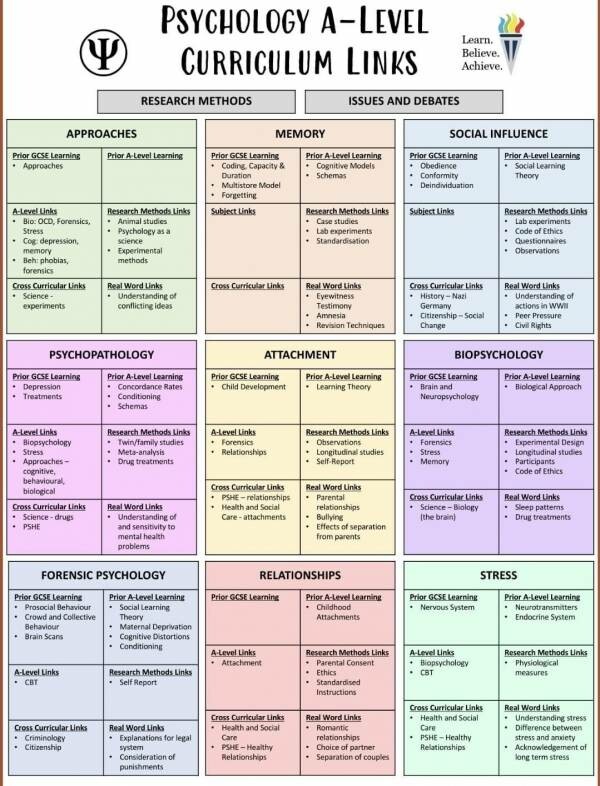Psychology
Curriculum intent
- To have uncompromising aspirations for every individual and for our school to be an exceptional and inspirational community of lifelong learners.
- To ensure all students have the knowledge to critically engage with the conversation of humankind.
Purpose
To develop courageous, intellectual, contemporary psychologists.
The intent for the Psychology curriculum is to ensure that our young psychologists are equipped with the necessary scientific knowledge, skills and vocabulary to develop a better understanding of themselves and the wider world. In addition, the psychology curriculum will enable our learners to value the importance of Psychological research and will promote an awe-driven curiosity of the human body and mind.
Key concepts that underpin the Psychology curriculum
- Approaches and Theories in Psychology (incl. Key Researchers, studies)
- Psychology in Context (Application)
- Experimental and Non-experimental Research methods
- Scientific and Mathematical Approaches in Psychology
- Critical Evaluative Extended reading, writing and thinking (incl. Command of Specialist terminology)
- Synoptic connections in Psychology (Evaluation)
How does our curriculum shape learners?
The Psychology curriculum will make a profound, positive impact on every student's academic, moral, and social outcomes. Psychology contributes to the moral education of students as it involves students discussing values, attitudes and beliefs relating to a range of ethical, social, and controversial issues (E.g., culture bias, ethical costs of conducting research, animal research, and gender bias).
Psychology is a multifaceted scientific subject; therefore, the curriculum is a channel for interdisciplinary learning by supporting learners to make connections between their prior and current study of Maths, English and the sciences, namely Biology and Chemistry. The psychology department follows the AQA specification which covers British Psychological society accredited topics such as human memory, psychopathology, social influence, forensic psychology, and stress. Research methods and data handling techniques used by psychologists are also a core focus. The broad range of topics taught in psychology such as research methods, biopsychology, conceptual and historical issues in psychology allow students to gain well-rounded knowledge in order to consider different pathways for the future. The curriculum content covered in A Level Psychology serves as a valuable basis for higher education courses such as psychology; neuroscience; law; business; nursing and can lead to careers in the health, education, and research sectors to name a few.
| ACADEMIC END POINTS | |
| Year 12 | By the end of year 12, students will acquire foundational knowledge of Psychological Approaches, theories, and core studies. In Year 12, the order of delivery focuses first on Introductory topics in psychology, including approaches, biopsychology, and research methods as these form the basis for understanding further topics in year 13. Additionally, emphasis is placed on introducing and mastering the extensive use of subject terminology unfamiliar to Year 11 who have not studied Psychology at GCSE. Yet, students will draw upon cross-curricular links between their prior GCSE attainment in English, Maths and Science. Year 12 students will begin to explore how psychologists evaluate theories and topics in real-world contexts and will be able to develop their evaluative academic voice. Year 12 students will understand and evaluate various research methods and engage in mathematical analysis through their active involvement in the research process by conducting their own ethical research. Year 12 students will develop the skill of applying their psychological knowledge to novel scenarios in the context of class discussions and exam questions. |
| Year 13 | By the end of year 13, students will acquire knowledge and a critical understanding of Psychological Approaches, theories and core studies. In addition, they will build upon their foundational knowledge of core approaches to learn about additional topic areas, including Forensic Psychology, Psychology of Stress and Relationships. Students will develop a greater understanding of psychology through a Biological perspective, advancing their knowledge from year 12’s Biological approach. They will be able to confidently evaluate theories and topics in real-world contexts such as culture, era, and gender and through developing and using their own evaluative academic voice. Year 13 students will build upon the mathematical skills built in year 12 and foreground their statistical abilities in Year 2 research methods. They will make synoptic connections across all units of study and display a command of specialist terminology in their oral discussions of debates in psychology and extended evaluative writing. Ultimately, students will become contemporary psychologists cognisant of how psychological theories change and develop over time and are influenced by modern breakthroughs in research. |
Click here to visualise the Psychology learner journey
Key features of learning
The psychology curriculum strongly develops ‘theory to practice’ thinking as lessons are designed in light of contemporary research; driven by high-order thinking and discussions which equips learners with a stronger awareness of how to describe, evaluate and apply psychological knowledge in ways that enhance human life. Moreover, the ability to engage in critical dialogue and present work orally, has wider social benefits, as critical thinking develops our learners into responsible citizens that are able to make better decisions on the basis of careful and detailed evaluation of evidence, which is important in an increasingly complex society.
What will you see in psychology lessons?
- Real world application lessons
- Analysis and evaluation through questioning and discussion.
- Lecture style
- Synoptic links being made between topics within Psychology
- Exam practice lessons
- Skills based lessons
- Creative lessons: Videos, Quizzes, Brain models etc.
What will you see in psychology books?
- Practice exam answers
- Pre-reading notes
- Acting on feedback (red-pen).
- Peer assessment (green pen).
- Information handouts
- Writing frames
- Example answers
What formative assessment will you see in psychology?
- Quizzes (Satchel one, Kahoot, Blooket).
- Questioning (e.g. cold-calling).
- Essay practice (12 and 16 mark).
- End of topic tests.
- Reviews of Learning.
What is the department currently reading and why?
- Psychology A Level: The Complete Companion Year 1 and 2, core textbook for Psychology
- Academic Journal Articles: Exposing students to academic journal articles within our discipline to expand their specialist vocabulary and familiarity with academic texts.


